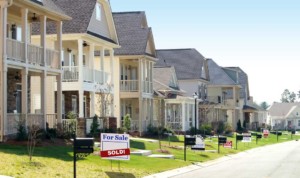
Redfin recently released a study about who supports housing density and who opposes it. The study found that homebuyers and sellers are nearly twice as likely to oppose the building of dense housing in their neighborhood than they are to support it. More than half (53 percent) support zoning policies that limit housing density near where they live. Nearly one in three support policies that enable it.
The data hits home with me, literally, because there’s a new housing development being finalized that buttresses our neighborhood. About 100 homes have been proposed to be built on a lot that once was slated as a new home for the county jail, until folks protested. It’s across the street from a middle school, which is next door to our intermediate school.
Many of my neighbors are outraged. I am on the other side of the fence. I firmly believe the development should be built. Housing density is the only way we are going to be able to provide affordable housing, especially where I live.
And there’s the rub.
First, I will confess my prejudice. I have been involved in Affordable Housing in one way or another almost my entire adult life. I ran Fannie Mae’s Seattle affordable housing office and coordinated its Foundation efforts locally, which was focused on building affordable housing. I have sat on my City’s Housing Taskforce as well as a County committee that award grants to affordable housing organizations.
What I have learned over a couple of decades is that when you disperse affordable housing within new developments, you strengthen a community and the neighborhood. And when you concentrate affordable housing in one area, you almost always end up with a failed housing development in the long run.
Not in my backyard
To me, the situation comes down to classic nimby at its best – Not in my backyard. Nimbyism is one of the biggest impediments to building accessible affordable housing. Unfortunately, it is fueled by ignorance of how affordable housing developments are financed, and protests are often filled with red herrings.
My neighbors who are opposed to this development are saying publicly the main reason they are objecting is because of the massive traffic the new homes built will generate. I believe this is a red herring as experience of past developments and impact studies say something else. The whispers I hear say that they don’t want affordable housing near their neighborhood. That’s kind of ironic, considering a neighborhood we built close to this development about 15 years ago also had affordable housing, but everyone seems to have forgotten that.
The Redfin study gave some great insight to how different segments of the population feels about density. It found that those who have benefited from housing density, not surprisingly, are among the biggest supporters of it. So are those in Gen Z, which looks like a Generation that has a huge heart.
The Redfin research found that African American respondents and those under age 25 were the most likely to support policies that encourage dense housing to be built in their neighborhood. The study also found that Black respondents were more likely than those of any other racial group they tracked to support policies encouraging density in their neighborhood.
The study also found that Latinx/Hispanics and Asian Americans were also more likely than white respondents to support density.
As Redfin chief economist Daryl Fairweather explains “Minorities, however, may be less likely to have sentimental feelings about the types of housing that characterize their neighborhoods because zoning policies have often contributed to racial inequality through segregation.”
Not just about income
One of the most powerful data points in the Redfin study was this:
“You might suspect that it’s just wealthier people who want to limit density and that the difference in sentiment between the racial groups is due to the income inequality between black and white families. However, income does not explain most of the difference in density sentiment across racial groups. When you break down the results by income, homebuyers and sellers in every income bracket were far more likely to oppose density than to support it.”
There’s another way to look at this as a former big boss of mine used to say when being interviewed about affordable housing. He said that homeownership is not only the best path to wealth for people of color, but the wealth that it creates helps make people colorblind.
Thank Goodness for our youth
Additional enlightenment comes when Redfin looked at how much age plays a factor and found this:
“In addition to the differences in sentiment about housing density by race and income level, respondents’ ages also correlated with their opinions on housing density. The oldest group of respondents—those aged 65 and up—were more than four times as likely to be against density in their neighborhood (64%) than they were to support it (15%). The only age group that had more people in favor of supporting density than opposing it was those under 25, of which 41 percent favored density and 36 percent opposed it.”
The Gen Z crowd gives me hope.
The bottom line
Housing density is necessary to build affordable housing. (It also reduces our carbon footprint, but that’s another blog post). Several members of our city council had no idea that the key to making the entire project work with the lowest amount of subsidy per unit was to build 100 units. That was the necessary threshold to qualify the development for the funding required to make it possible. You can’t simply reduce the number of units from 100 to 60 to appease the nimby crowd, as some on the council tried to suggest: that math doesn’t work.
We know communities benefit from diversity. The same is true about housing and why nimbyism is bad for all housing. What eliminating density really does is reduce diversity.
Right now, it looks like my local development is going forward, approved by the city council. Yet there’s still an active anti-development Facebook Page that continues to advocate not building it in our backyard.
Having seen what smart developments like this has done elsewhere, I say build away. We desperately need affordable housing in our community and should embrace density when it makes sense.
Kudos for Redfin for taking on a tough topic. You can see the Redfin study here.
# # #




